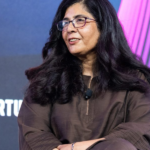The recent high school graduate boasts 6.4 million followers on TikTok and is most known for her popular videos showcasing how she starts her mornings, as well as showcasing brand-deal trips and her recent move to New York City from Vancouver, Canada.
“I think I’ve always known that I was going to stay in school. I never really took a break—I was online for two years, so it kind of felt like I wasn’t in school, but I was,” Fang told Fortune. “I wanted to go to NYU for the longest time. Just because I started social media, and it became my full-time career, doesn’t mean that dream ever faded.”
Fang’s long-term goal is to start a business after college and to continue to build a personal brand.
“I think the most important thing is just don’t rush to have it all figured out, because especially when you’re so young, you’re not going to know everything,” Fang said.
“What I enjoy most is probably how creative everything is,” Fang said. “It’s crazy how you can make the most random video that makes no sense, and that ends up being the one that gets millions of views.”
Fang is just one example of how young people have been able to turn a passion project into a runaway for a high-paying career, where they are their boss.
“This is what I love doing, I’ve never had as much joy doing something as I do this,” Donaldson said. “I just never give up. There’s no world where I would ever quit. When I was 11, I just said I’m going to be a YouTuber, and I’m going to die trying, and I meant it. Even if there were no one still watching my videos to this day, I would still be going. I’m just the most competitive, stubborn person you’ll ever meet.”
At first, Donaldson’s mother did not want her son to pursue a career in social media because she wanted him to be successful and encouraged him to pursue a college degree instead.
“When people tell me I can’t do something, it makes me want to do more,” Donaldson said. “If you tell me I shouldn’t do something, that’s fine, but if you tell me I can’t, then everything in my body just wants to go.”
Joining YouTube in 2009 and initially posting videos of himself playing games, Williams built a following of over 50 million across all his platforms. Unlike his peers, Williams decided not to pursue college at all in favor of his blossoming content creation career — in part after realizing how much he was earning before attending university.
It’s becoming easier than ever to start a career as a content creator and make a living without a college degree. After all, all you need is a phone to get started.
“It’s important that you try to cultivate your fan base. Otherwise, the only way to reach your own followers is to boost your posts and buy ads,” Nager told Fortune. “A lot of people didn’t become creators to spend money. They wanted to make money, but the platforms want to make money.”
Many creators build their email lists so they can directly notify followers when a new video is released, often encouraging them to watch and leave a comment. He also suggested that creators interact with followers in the comment section, something that is favorable to algorithms.
“You want your users to comment on your posts, because if they do, it means they really care,” Nager said. “Now, the comment could be negative. They could hate your video. Nonetheless, the algorithm reads it that if you’re willing to take the time to comment on the video, not just liking it. So this means that your content must provoke comments. Sadly, that means that a lot of influencers become controversial on purpose.”
This type of collaboration is a key strategy for building influence and trust without a degree requirement. Nager also advised new creators to partner with others, regardless of their fame, emphasizing that exposure to each other’s audiences helps both grow.
In addition, he said that to stand out, creators need two key traits: personality and perspective. They must be relatable yet aspirational, offering a unique voice and sharing their human side to form real connections. Otherwise, they risk being replaced by generic content.
While a formal education isn’t required to break into the industry, Nager said, it offers key advantages.
“I think you need an education to learn from your mistakes, without suffering. We can all learn from suffering, but let’s avoid it. Let’s learn how to analyze data,” he explained.
And while ultimately content creators can and have succeeded without degrees, Nager said more education can also expand one’s worldview and creativity outside of your path.
“Can you be educated without college? Possibly, if you love to read,” he said. “But college lets you explore courses outside your field—take astronomy if you’re a writer, or music if you’re a scientist. It doesn’t mean that you’re going to become a musical expert, but something about music may change the way that you think about chemistry and performance.”









